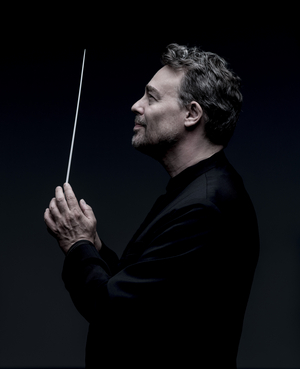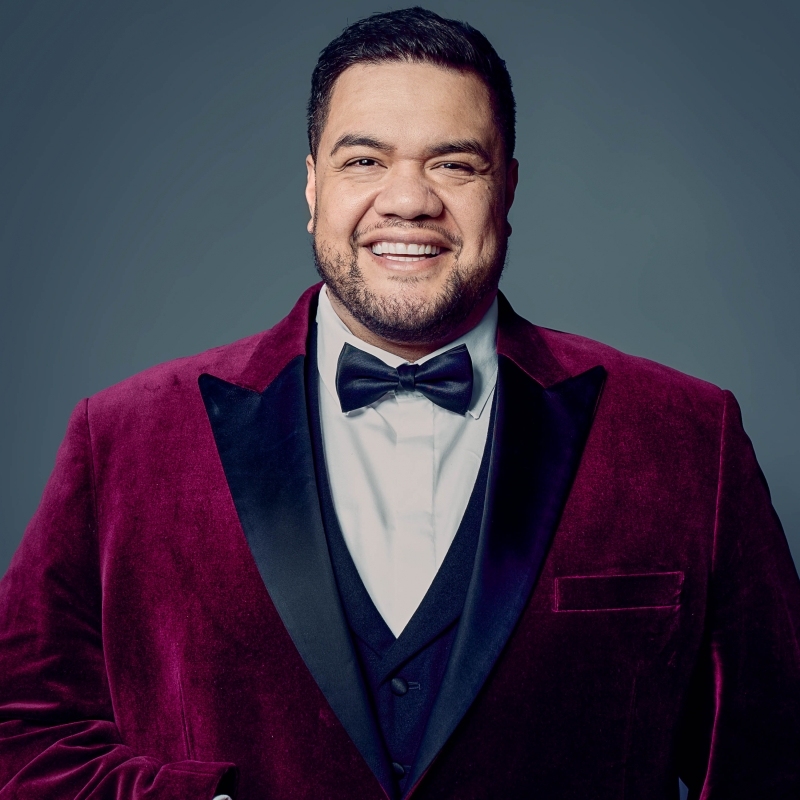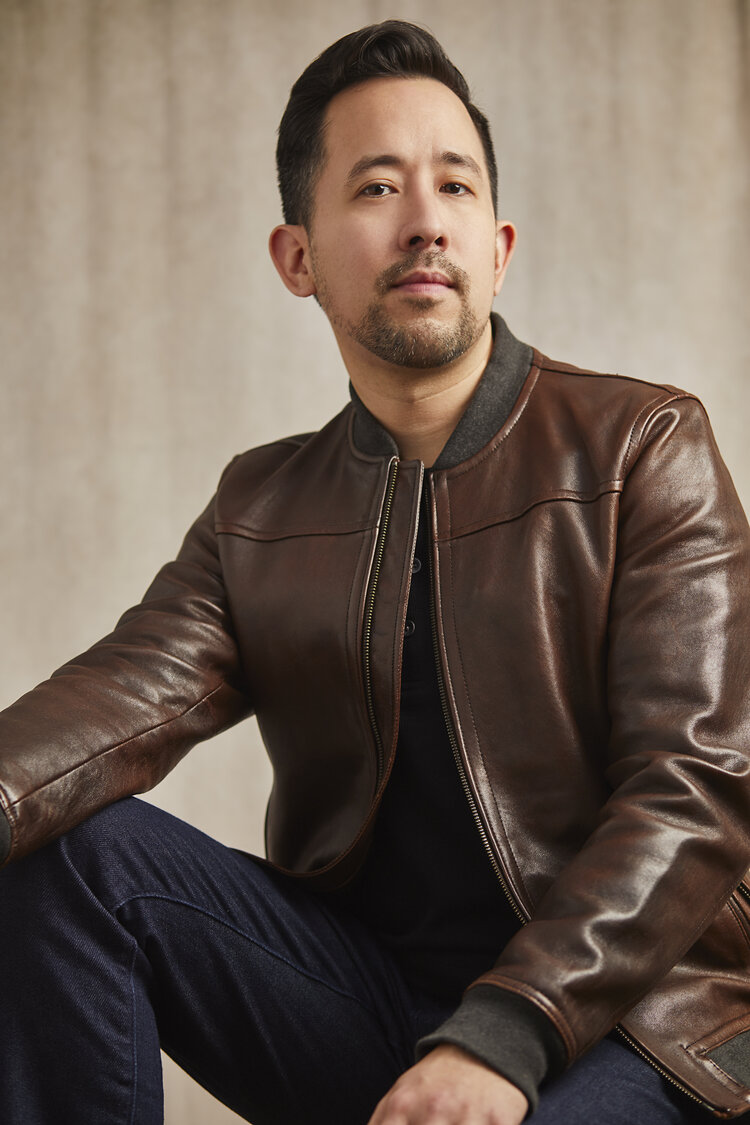Interview: Yves Abel of SAN DIEGO OPERA'S ROMEO AND JULIET at San Diego Civic Center
An Opera Conductor Discusses How the Magic Happens

Conductor Yves Abel arrived in San Diego from Europe a few days ago to begin rehearsals for Romeo and Juliet by French composer Charles Gounod. The Maestro does get around a lot, even for an internationally in-demand musician. His wife and boys five and eight sometimes travel with him when he conducts but remain at home in Italy this time.
Perhaps Abel's wanderlust began in childhood. His family immigrated from France to French-speaking Quebec when he was young. His father couldn't find work there, so it was off to English-speaking Toronto where he spent most of his formative years. Next stop New York City for study at the Mannes School of Music, and after New York frequent work in Italy, then Germany. Abel's travel has resulted in fluent French, English, Italian and German. We spoke via Zoom.
"I find that speaking the language is an important asset." It often means clearer directions to musicians, and a better sense of the composer's intended tempos and phrasing. "It also helps you to understand the opera's characters. It's one thing to translate, but it's another to feel what's behind the words and between the lines."
While Abel trained as a conductor in New York, he worked with well-known professionals including Leonard Bernstein. "I have these great pictures of him with his hands on my shoulders. I was conducting from a piano in a kind of masterclass situation and had just finished the very difficult opening of Brahms' third symphony. He put his hands on my shoulders, looked me in the eye and said, 'You weren't listening to a word of what I said, were you.' To which I replied, well, I thought I was, but I guess I didn't come out that way. He was very warm, very friendly, saying things like, 'Try that here.' It was an amazing experience to work with such a brilliant man.
"It's never easy at the beginning, you know, and one of the things he told me was, 'You've got two ways to make it in this business. You either get somebody like me, to help you out, and become an assistant of mine or another big-name conductor, or just go out there and start your own thing.'
"Well, I was like, I'd be very happy, Maestro to be your assistant, get your bags, bring you coffee. Whatever you want. But he died the following year, and that avenue was out." So, he took Bernstein's second option. Lacking connections in the field he decided he would start his own thing, "become a real enterprising American, and try to find my future that way. I started a little company called L'Opéra Français de New York. And you're gonna laugh; the first opera we did was Romeo and Juliet by Gounod.
"So I have a long relationship with the opera and it's dear to my heart. But when I say we did that opera, I mean I conducted from the piano and students sang the parts. My next-door neighbor was the director. No orchestra, but we did have costumes, a few set elements and lighting." The company grew rapidly from that simple beginning, staging a series at Lincoln Center just two years later.
Not all went as smoothly early on. When he debuted at the Paris Opera in Gounod's Faust, it had often been performed there before. "I'll never forget the director of the opera at that time said, 'I heard that this young Canadian guy is really good in French music, let's try to bring him in and do this piece.' I naively said, yeah sure, why not? So he gave me four readings with the orchestra alone, and there I am, a young guy trying to change their traditions. Let's just say that it was a difficult relationship with things sliding quickly downhill. Somehow, we got through it. And 10 years later, they invited me back to do Hansel and Gretel."
Abel first performed in San Diego when General Director David Bennett's predecessor Ian Campbell was in charge. The visit left fond memories of the city. "My wife was with me, and we discovered she was pregnant."
When Bennet replaced Campbell, he'd already seen Abel perform. "And I guess liked what he heard because he made me principal conductor. So...that was a good sign."
Romeo and Juliet will mark his fifth appearance in San Diego. "I have to say I was really happy about yesterday's rehearsal. But this French music-it's extremely difficult to find the right

singers for the style. Pene Pati is someone I worked with just two years ago in San Francisco for Romeo. That's always the hardest role to cast. A tenor who can sing this French Wagnerian-length opera is rare. He has the technique that makes him able to sing the five acts, and without too much effort.
"I think the problem is that technique has changed over the years, in the day of Gounod, people would sing in a very different way. None of the high notes were ever sung with today's full throttle, what we call chest voice. They sang the top with, not a falsetto, but a mix between the head and chest voices." Training is making voices stronger to satisfy today's audiences. "There's a visceral excitement about hearing a tenor's thrilling powerful high notes." People respond to loud entertainment today and opera houses are bigger than they were in the nineteenth century. "These roles were never sung in a place the size of the San Diego Civic Center."
Abel has also conducted in The Metropolitan Opera's large hall. His earliest performances there were a particular challenge because he had little advance notice. "I guess they're not afraid we're going to have a heart attack when you're young. They throw us into the fire pit with the orchestra looking at you and going, what is this guy going to show us or teach us? It's an experience in the lion's den. The first time was doing The Barbara of Seville without a rehearsal with the orchestra. I had been assistant, so I knew the tempi the previous conductor had taken, and of course tried to follow in his mode with maybe a few more personal things I knew I could get away with.
"It's a funny thing. I've conducted a lot in Berlin and Vienna, for example, where you don't have a rehearsal of the orchestra. And that's shocking. You have to be super clear with gestures and technique so that the orchestra immediately understands. There's a kind of sign language." He provided a simple example, gesturing with his fingers to indicate a time signature for a new section of a piece. Much more pantomime may be needed when the musicians speak a language a conductor doesn't know.
Abel recently left the North West German Philharmonic. "I'd been there for seven years. It was a lot of hard work and difficult to get to. I wanted more time for myself. Then San Diego came along as principal conductor and I thought, it was time to move on. But I'll go back there as a guest conductor. It's a wonderful orchestra, and I've maintained a beautiful relationship with it."
The French-Canadian maestro has an unusually even split between operatic and orchestral conducting. "In Europe there isn't the sort of stigma that opera conductor is written across your forehead. But they are different disciplines." He believes it's usually easier for opera conductors to do both because of having to deal with language and singing styles. "And the particularities of working with singers can throw some people into wanting to tear their hair out."
When I suggested that opera conductors had more of a supporting role, Abel disagreed. "Well, funny thing, it seems that way certainly because you're down in a pit. But anybody who's intimately involved will know there isn't a single line sung that doesn't have something we've discussed in rehearsals. We rehearsed yesterday for three hours. But this morning, I had another three hours with several individual singers to discuss how to sing that and what color do we want here. Is the character impetuousness or is it a warm and friendly moment?
There are a million ways to say I hate you, or I love you, and the singer, stage director and I decide together. I always laugh when I see reviews that say at the end, Eva Bell or whoever conducted and kept the orchestra nice and soft." (Often guilty as charged, but in my defense, I'm thinking of support for singers during the concert when they, not the orchestra, are in the spotlight.)
Since conductors affect how singers approach their roles, there may be disagreements with the director. "Oh yes. There are directors I want to hang, then draw and quarter."
Fortunately, they include neither Matthew Ozawa, director of the current production, nor Bruce

Stasyna, Chorus Master and Music Administrator of SD Opera. "Matthew is very musical with a real sense of theater, and Bruce is a wonderful friend of mine." He, like Abel, speaks fluent French and has been helping with French diction.
Romeo and Juliet, like many of the most popular operas, was written more than a century ago. Changes in language, musical instruments and singing styles make it more difficult to decide exactly how a composer intended a piece to sound. "We were just talking about that this morning. This opera was written in the 1860s, so we're not talking about Puccini or Massenet. It's still something that's been greatly influenced by all the Italians." The operas of Donizetti, Bellini and others were often premiered in Paris, and French composers were listening. "So if you bring that world into French Grand Opera, you've got more of the right stylistic feeling. I find many recordings of this opera insufferably heavy. I don't think Gounod ever intended his opera to last a Wagnerian-like five hours.
As for operatic voices, "Do we use the tradition of Pavarotti, Carreras and all those tenors, or go more towards Baroque. There's a lot of coloratura for the soprano, and you can't sing that with a heavy style. I think you've got those two branches at the same time and, of course, we do both. At the end of act three our tenor should be singing those high Cs in a massively exciting way, just like the high Cs in Traviata. We want that excitement." Abel knows tenor Pene

Pati will supply it. "And he holds it forever too, which is amazing."
The maestro and Director Ozawa have also discussed how Shakespeare's play and the beliefs of the composer's era affected Gounod. Catholic thought was especially influential. Abel says the latter comes naturally to him since he was raised as a Catholic.
And he has long loved Gounod's music. "It's beautiful, just one glorious melody after another. We have a great cast, a great director. I worked for the first time with the chorus last night. It's always excellent, and the luxury of having the San Diego symphony is also huge. Not every company has an orchestra on this level. I very much look forward to the performance. I think you're going to have a really great show. (And I'm happy to be in 75-degree weather here in San Diego rather than somewhere freezing.)"
For Romeo and Juliet times and ticket information, visit the San Diego Opera website. The first performance is Saturday, March 26.
Photos compliments of San Diego Opera
Videos

